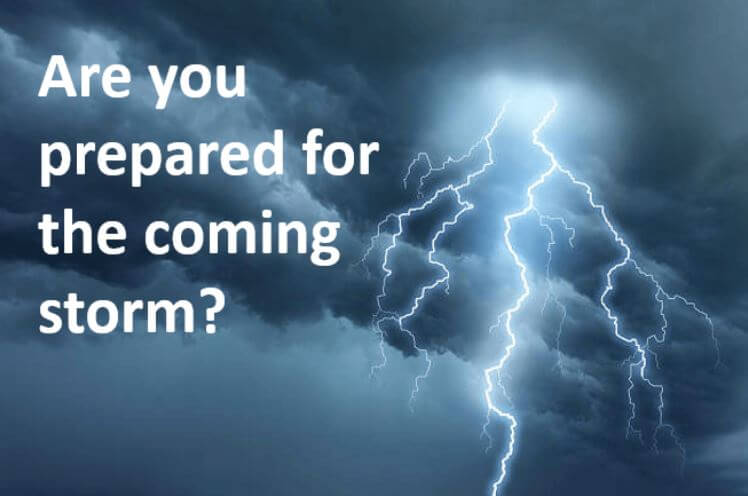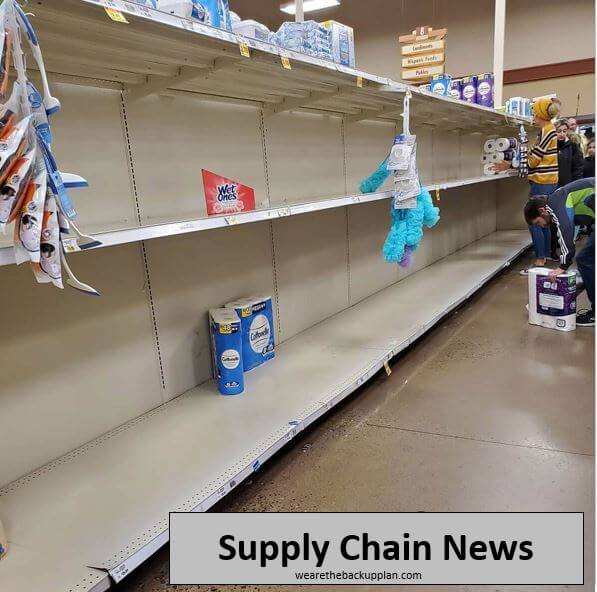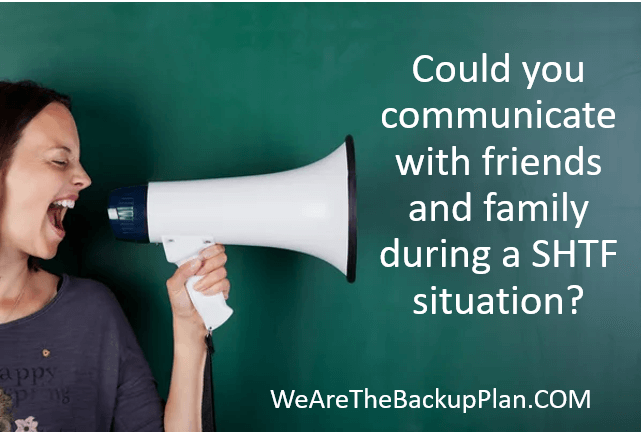Why Should I Prepare?
The simple answer is because bad things WILL happen. The odds are stacked in favor the house. The problem is in our case, the “house” is the bad luck.
Planning and preparing never matches reality. But a plan and the resources, process and knowledge can be applied when things change.
“In preparing for battle, I have always found that
Dwight D Eisenhower
plans are useless but planning is indispensable.”
The example below shows the likelihood or “odds” of a given event. Note these are our personal estimates of odds. You can calculate using your own numbers.

- Lifetime Likelihood of various types of Disasters
- Calculating the odds of a Solar Flare (CME)
- What are the odds?
- What are the Odds of War?
- What are the Odds of Terrorism?
- What are the Odds of Financial Collapse?
- What are the Odds that We Will Run Out of Natural Resources?
- What are the odds of Food Supply Interruption
- What are the Odds of a Major Power Outage Taking Out a Large Section of the Electrical Grid?
- What are the odds in the real world?
- What are MY odds?
- Conclusion
Lifetime Likelihood of various types of Disasters
The main point is that in a 20 year window, some things that seem unlikely become far more likely. If you extend everything to a lifetime of 78 years the odds get even higher. (see below)

These are estimates only and intended to show that risk varies with the type of event, region and length. I am positive some of the numbers are wrong, but they are not wildly wrong.
Use these numbers as starting point. You should plan on the likely risks and you will likely protect yourself from at least a portion of the less likely but bigger impact risks. The impact could be no power, no fuel and no transportation during a flood or snowstorm or earthquake, even if it is limited to your location.
No plan of operations extends with any certainty
Helmuth von Moltke
beyond the first contact with the main hostile force.
Calculating the odds of a Hurricane
Some math will help you figure out the likelihood of a risk. The chance of a hurricane for someone in a hurricane prone area is 5% or higher each year. That means you have a 95% chance annually of NOT being in a hurricane. For a 10 year period you multiple .95 by itself 10 times or .95 to the 10th power. That means it’s only 40% chance of NOT having a hurricane over 10 years. In reverse that means you have a 60% chance that there WILL be a hurricane in 10 years. This varies a LOT where you live. That is one of the reasons insurance companies will generally charge a lot for hurricane insurance, the odds are not in their favor.
Calculating the odds of a Solar Flare (CME)
A major solar flare is also called a Coronal Mass Ejection (CME). I is similar to an EMP (Electro Magnetic Pulse) from a nuclear bomb – but could last much longer. Solar flares hit earth regularly and the odds are that a big one will eventually hit earth.
The 1859 CME light show and electromagnetic storm lasted for two days. It affected the entire planet. Telegraph wires started on fire, telegraph machines scorched paper printouts, stunned operators with shocks, transmitted gibberish, and continued working for hours even after being unplugged from the batteries that powered them. Even at this lower level it would be devastating to our modern electronic environment. A tiny solar flare event caused Toronto to be without power for an entire day in 1989.
What are the odds? It’s 2 times in 160 years, or a 1.25% chance each year. Lets even skip the small one in 1989 and assume only 1 in 160 years. Once in 160 years is a .63% chance. The math says the chance of a major solar flare is 6.08% in 10 years or about 1 in 16. So it seems crazy because the odds of 0.63% per year are low, but the math does not support luck; luck runs out.
For more info on electro magnetic pulses see: https://commonsensehome.com/electromagnetic-pulse-emp/
What are the odds?
What are the Odds of War?
Calculating the likelihood of local, regional or global wars is hard. Given human history and current behavior of governments around the world, the odds, unfortunately, are increasing. As noted by BJ Campbell since 1453 we have seen 465 sovereign nations disappear. That means there is an annual 82% chance annually that a country will cease to exist. Now that is less likely in the larger countries? No.
The odds are bad. From his article “France had a 30-year war, a seven-year war, a particularly nasty revolution, a counter-revolution, that Napoleon thing, and a couple of world wars tacked on the end”. The US has had two major events since its founding in 1678. Again from BJ Campbell, that is roughly two major civil wars in 340 years so 0.5882% per year risk. That means in your lifetime there is a 37% of another major internal US war.
If you add in WWI, WWII, Korea and Vietnam means the risk jumps from .588% to 1.765% and over 78.7 years (average lifespan) the odds of war impacting us jumps from 37% to 75%. Unfortunately the odds and not in our favor. The higher number is albeit a smaller impact.
What are the Odds of Terrorism?
Add in terrorism and local idiots with a gun and the odds of a small impact to your life jump to uncomfortable levels. We also have variable risks from widespread man-made disasters impacting fuel prices, food supply, power grid, and of course pandemics.
The good news is it seems smaller conflicts around the globe have been letting off steam for the possible larger wars since WWII. Over the past decade antagonism has been building up between many groups around the world. A big example is radical Islam and anyone who opposes it. Increasing demand of growing populations for land and resources will also raise tensions. From 355ad to 1291ad there were 309 muslim wars, invasions or major attacks. That is a 33% per year chance for an attack.
From 1970 to 2019 there were 282 muslim terrorist attacks as reported by WIKIPEDIA, which in my opinion is a low estimate. But using that estimate that means there are 5.75 attacks EVERY YEAR worldwide. In the US alone it is 10 in that period so that is a 20% chance annually – and given under reporting it is closer to 30%. If you only take big ones there are a couple that killed over 100 so using the math, the odds are again in the 30% to 70% range in our lifetime, depending on how big the event is you are planning on.
But even with that high number it only measures the likelihood of the EVENT not of you being killed in the event. To calculate that we need to add in population – which dramatically lowers your odds.
What are the Odds of Financial Collapse?
Financial collapse has happened many times before, with smaller short term recessions and full blown depressions. We are seeing major financial problems periodically throughout the world. Combine financial instability with increased instability in the middle east and you increase the odds of at least a global recession if not a full global financial failure. Add a full war into the mix and the odds go way up. Many people believe it is almost inevitable that we will see massive inflation based on government spending and monetary policy from 2005 through 2017.
Even if its not the end of the world, we can expect some serious financial events because of government deficit spending, the same thing that would happen if we spent more than we had individually (just multiply it by billions of dollars).
What are the Odds that We Will Run Out of Natural Resources?
There are groups of people who believe we will run out of natural resources (iron, wood, water…) fill in your favorite item. This might even apply to food which is more logical as food production varies with weather which is quite hard to predict, much less control.
Improvements in reducing waste should be made, as well as developing new, lower impact technologies to use resources more wisely, and to recycle existing waste.
The odds are you will get older; so building your home or modifying your home to better fit you as you age is a good investment. Think “Cradle to Cradle” design. For more information see our article: Aging in Place – Making Your Home Livable for a Lifetime
What are the odds of Food Supply Interruption
Two years of even minor interruptions in food production would impact global food prices. Make the interruptions medium or large and it would be equal to or worse than a global economic collapse. This is a serious area of concern.
What are the Odds of a Major Power Outage Taking Out a Large Section of the Electrical Grid?
In a nutshell unless something changes, brownouts and power outages will spread throughout the US. Regardless of the big events, small interruptions in service are likely and actually likely to get worse given an aging power system. Worse yet power plants being retired far faster than we build new ones.
Think of it this way, if the electricity isn’t working in your house and you don’t have light, water or heat, it really doesn’t matter why.
What are the odds in the real world?
When you pile all the possible bad things together the odds keep getting higher and higher that “something” will happen in a 10 year period. A civil/national war has a 37% chance in 10 years. A hurricane is 92% chance in 10 years. A solar flare is a 6% chance in 10 years.
All these increase the likelihood of something bad happening. This is why there are “force majeure clauses” in every insurance agreement and important agreement. Shit happens and it is well known but not often discussed.
With all this doom and gloom we should all be dead or know someone who was killed in some awful way. The odds of an event are the NOT the same as the odds of the event impacting you. The odds for a lot of these events are CUT by population and location.
Most terrorist events have a local impact only. Hurricanes only hit specific areas. But that is no consolation for those people caught in the events. Plan to be caught in the event, but God willing none of us will be involved. But God gave us a brain, hands and we resources so we need to prepare.
What are MY odds?
Look at your family history. How many times have you or your parents lost a job. What are the economic conditions where you live? How many times have you lived through a minor or major disaster? Use the math and you can estimate how much money, time and resources on preparing. This will give you a realistic estimate of your personal, family and/or community risks.
Predict what is likely. Plan on what to do. And it will Prepare you for those and other events you might not predict.
Personal example: My wife and I had been planning on saving money to buy a new 4wd vehicle and add an outbuilding. I had been gainfully employed sometimes with multiple jobs at once for 20+ years. Then I was laid off unexpectedly during a merger.
- Our prediction was to buy a new van and build and outbuilding. We also predicted likely power interruptions, and some minor food supply interruptions.
- Our plan was saving money and stocking on up beef (frozen in a chest freezer). Long term our plan was to be more self sufficient, and have enough to survive likely problems and likely natural disasters.
- We were prepared for success and some likely events. Then I was laid off. We didn’t plan on that, but the cash and meat in the freezer held us through until I found another job.
No man is worth his salt who is not ready at all times to risk his well-being, to risk his body, to risk his life, in a great cause.
– Theodore Roosevelt
Conclusion
This information may seem overwhelming. Just focus on preparing the basics. We can’t spend ALL our resources on That will put you ahead of most people. Stockpile food and water, and have extra fuel. Balance all the crazy input with what you know to be reasonable, trust your gut and have a plan.
References
- https://www.ready.gov/
- https://www.redcross.org/get-help/how-to-prepare-for-emergencies/survival-kit-supplies.html
- The Surprisingly Solid Mathematical Case of the Tin Foil Hat Gun Prepper
Related Links
- Excellent (long) Getting Started Prepping Post https://theprepared.com/prepping-basics/guides/emergency-preparedness-checklist-prepping-beginners/
- Power Grid Fails https://commonsensehome.com/when-the-power-grid-fails/
- EMP https://commonsensehome.com/electromagnetic-pulse-emp/
- https://commonsensehome.com/bug-out-bag/




